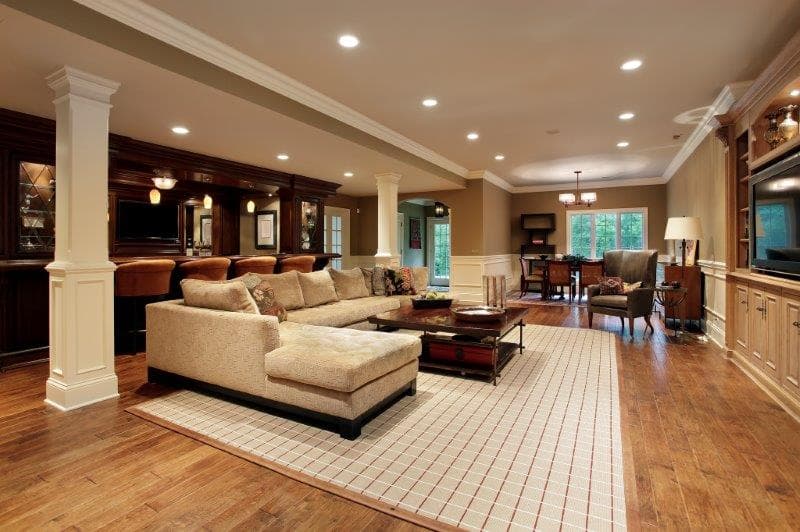
If your house is starting to feel a little too cozy, and you’re due for a change, it might be time to add a home addition. Maybe you’ve considered all the stylistic angles, but need to get more of the logistics covered.
There are several things to consider before moving forward with a home addition, as this project is a huge undertaking. Not only will it be time-consuming and costly, but your daily routines will also be put on hold for a period.
Nonetheless, home additions add space and value to your home. If you’ve got a clear goal and a budget, you’re almost ready to start your home addition project. However, make sure to consider the following questions to decipher if you’re really ready for that home addition.
How much will your home addition cost?

source: Flickr, designmilk
The cost of a home addition will vary, and depend on many factors including the type of addition, the size, as well as the construction of your home and how much work is needed to be done. A good rule of thumb to consider is, the more you build the less it will cost per square foot.
You can bring additional costs down by adding a room to the existing footprint of your home, such as adding a room to a basement. It would also be worth considering adding a room outside of your home, such as a backyard home office.
Furthermore, most home renovations can’t be completed with cash upfront, and homeowners need to secure funding to take these projects on. In the case of some large-scale projects, work can be broken down into steps so that additions are built and paid-off over time. Most homeowners pay for additions by refinancing their homes or taking out a loan.
A home equity loan, second mortgage or line of credit are all viable options, based on the amount of equity and value that their homes have. Also, remember to think of the resale value of your home when taking on any form of renovation. Even if you have no plans to sell anytime soon, you’ll still want the best possible appraisal of your home so always consider the resale value of your project.
How large will the project be?
When you build an addition on your house, you must be prepared in the same ways you might be for building a home. The project may be smaller in scale, but all stipulations are similar to constructing a home. You must consider permits, contractors, your home's foundation, electricians, plumbers and the list continues.
Also, consider how the additions will tie in with the rest of your home. Adding to the existing structure takes a bit of finesse to make the new room look as though it belongs. Think about things such as the way the roofline connects to the house, how you’ll complement your style of house while creating something that is functional and provides the maximum benefit for your family.
Not only is the project a large job in practice, but it will also have an emotional weight to it. Adding a room or extension can be a noisy and dirty experience. For example, if you are expanding your kitchen, think about how and where you will prepare meals. If you own pets, it may be safest to kennel them for the duration of the renovations. Even the best and smoothest home addition projects will be mentally straining for both homeowner and your family, so bear this in mind when choosing the scale as well as the time of this undertaking.
Who should you hire?
Choosing a contractor for any scale project is important. The professional you select will be spending an ample amount of time with your family, and their role will be greater than the project itself. With that in mind, the importance of a contractor cannot be underestimated.
The first meeting with your contractor is key to building a relationship, as well as establishing the contractor’s timeframe, general design issues as well as cost. Make sure you are prepared for all meetings with a detailed plan, as well as a budget. Bear in mind that costs will likely be higher than you anticipate, so leave some leeway in your budget.
Further, depending on the scale of the project, some homeowners may choose to hire an architect. A contractor can design your addition, as they may have stock addition piles.
Alternatively, consider asking the contractor you hire to recommend an architect, as they may have one who they are accustomed to working with which could be beneficial for you in the long run. Take your time when choosing someone, and make sure it's the right fit before moving forward.
Permits and Preparations for a Home Addition?

source: Flickr, Brock Builders
Your contractor should obtain the necessary permits, but make sure to check the legitimacy of these before moving forward with tearing down or putting up any walls. Consider zoning restrictions, as many cities and municipalities have rules and laws regarding where you can build an addition, as well as how much of a property can be covered with impermeable materials.
The approved permits will have to be posted in a viable spot on your property. It will be necessary to move any obstructions that may hinder the renovation process, and this includes trees and other fauna. Fences may need to be taken down temporarily to allow for heavy equipment and machinery to access the site.
Would you like to extend your mobile home? Take a look at our article Mobile Home Addition: How to Expand a Mobile Home.
If you want to learn more about home additions and other such projects, here are more articles on our blog:
Get 3 renovation quotes for your home renovation project
RenoQuotes.com can help you get quotes for your home extension project. If you submit your project to us, we’ll put you in contact with top-rated contractors. Fill in the form on the homepage (it only takes a few minutes), and you will get estimates from trusted professionals.
Dial 1-844 828-1588 to speak with one of our customer service representatives
Looking for something else?
Related articles
The latest industry news, interviews, technologies, and resources.

Editorial Team
•05 Dec 2025
Paint is the cheapest and easiest way to improve the look of any house while improving curb appeal. Not only does painting help your home to look its best, but it also helps to protect it from the climate and various elements. But, let's get real for a second, painting the entire exterior of a home is a huge job to take on.

Editorial Team
•08 Nov 2023
Between freeze and thaw cycles and bad weather, your house may show signs of sinking. Since this could cause major damages to the foundation, this article explains how it can be fixed.

Cynthia Pigeon
•08 Nov 2023
Are you looking to close off your double living room, kitchen, closet, or guest bedroom? The space itself is already divided, all you need is a door, really. Hinged, swinging, sliding, pocket, folding, pivoting: there are a ton of door models out there, and you are bound to find one that will fit your needs, and that will not clash with your decor.

Cynthia Pigeon
•12 Apr 2024
Are you tired of looking at a spent lawn and thinking of laying sod to spruce it up? Question is, how should you proceed with this little seasonal project?

Léa Plourde-Archer
•05 Dec 2023
If you are looking to add brightness to your basement, there are many simple options available to you. Of course, the main source of natural light is always the window. Therefore, it is important to clear any windows so that the basement benefits from the natural light and not the furniture or curtains that block it.